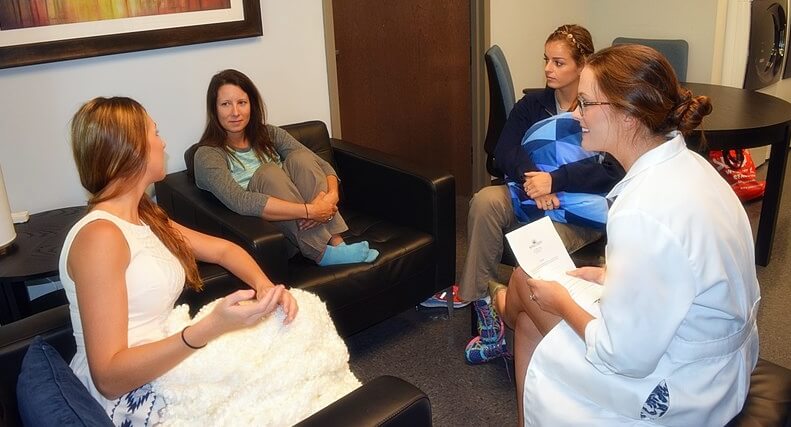
Group therapy employs evidence-based psychotherapeutic strategies in a collaborative setting to help patients understand the nature of their struggles and learn coping methods to help prevent future substance abuse. In structured rehab programs, group therapy sessions are comprised of many individuals, all battling addictions to a multitude of substances.
Group therapy sessions facilitate an atmosphere of interpersonal openness and goodwill, wherein individuals can feel comfortable sharing their personal stories and exchanging constructive suggestions with fellow group members. A mental health specialist, such as a psychologist or psychotherapist, oversees each session, ensuring that it remains beneficial and free of condemnation.
Compared to one-on-one therapy, clinical evidence suggests that group therapy is equally effective.
Benefits of Group Therapy
Patients can expect a wide array of benefits from group therapy. Having a structured system of support helps combat the overwhelming feelings of isolation and loneliness that characterize life as a substance abuser.

Throughout the process of recovery, one often endures temptations, both chemical cravings and as an invasive rational thought process that begs the question, why not? – unaccompanied by any obvious counterargument.
Simply put, Engaging with a group of other individuals facing similar trials allows one access to the wealth of experience obtained by others further advanced in their recovery. Witnessing the success of others often inspires our own resolve in the face of temptation.
Despite similarities, group therapy within a rehab program and a 12-step program are not the same. A 12-step program accommodates a very high number of members, none of whom are required to participate. Conversely, group therapy sessions are strictly limited to 12 or fewer members and participation is compulsory.
Restrictions such as a limited group size and mandated interaction between members ensure that each individual progresses appropriately, developing the skills necessary to confront their issues. Group dynamics tend to reinforce honesty among the members, working to expose and eliminate self-destructive beliefs and patterns of thought.
Cognitive-Behavioral Therapy

The therapist leading a group has several support models at their disposal. Among the most common is cognitive-behavioral therapy (CBT), a psychotherapeutic method formed around the idea that our behaviors result from the way we think.
Considering this view, the fact that our lives descended into ones characterized by addiction indicates that our thoughts, beliefs, and morals concerning the world are fundamentally addictive. Because of this, it is imperative to revolutionize our mental approach to life completely.
Ideally, CBT in a group setting exposes, analyzes, and conquers all aspects of addictive mentality for each of the members. In this way, each individual undergoes a professionally-guided development of autonomous self-control, enabling a permanent recovery through the ability to recognize and choose a healthy, meaningful future, unchained from a tragic past.
Furthermore, group dynamics foster long-term sobriety by encouraging each member to serve as a successful role model for newcomers and other group members. Substance rehab programs that offer individual and group therapy in combination are statistically the most effective. However, when such a situation is unavailable, group therapy seeks to maximize the efficacy of an individual’s time spent with the therapist.
Group Therapy in Rehab
After patient detox, our center offers group therapy in both inpatient (rehab) and intensive outpatient formats, as well as individual therapy, family counseling, nutritional support, 12-step program meetings, and holistic services such as meditation, yoga, and art therapy.
Inpatients benefit from around-the-clock medical and mental health care and support. Residential treatment is best for those with severe addictions and those who can take the time away from life responsibilities to engage in treatment. At rehab, patients reside at the center 24/7 for at last 30 days during the initial stages of recovery.
Conversely, outpatient treatment may be better for those with less severe addictions or need more flexibility to attend to personal responsibilities such as work, school, and family. Also, discharged inpatients are encouraged to participate in outpatient therapy while they are transitioning back to the outside world.
After intensive treatment has been completed, former patients can take advantage of discharge planning services which help identify local resources that can be used for ongoing therapy, counseling, and group support. Also, our center hosts alumni activities that foster long-term peer interaction and comradery.
Our programs are structured with various components of evidence-based treatment practices and holistic approaches to treatment that provide our patients with the knowledge and tools they need to be successful in their recovery.
If you or your loved one is suffering from substance abuse, please seek help as soon as possible.